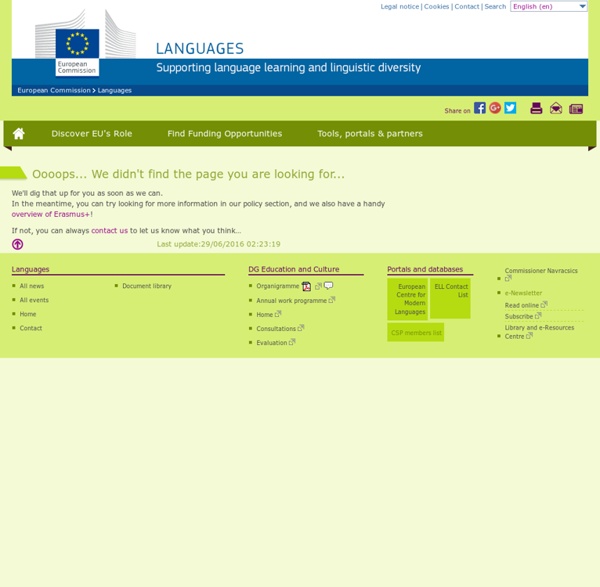



http://ec.europa.eu/languages/404_en.htm
Commission européenne - Le quiz des langues À propos de ce quiz Vous pensez savoir une chose ou deux à propos des langues? Testez vos connaissances avec notre quiz sur les langues européennes. Dessins Cultural Connectives: Understanding Arab Culture Through Typography by Maria Popova What typography has to do with cross-cultural understanding and linguistic minimalism. I’m obsessed with language, such a crucial key to both how we understand the world and how the world understands us.
CLIL: A lesson framework Underlying principles Classroom principles Lesson framework Conclusion Underlying principles The principles behind Content and Language Integrated Learning include global statements such as 'all teachers are teachers of language' (The Bullock Report - A Language for Life, 1975) to the wide-ranging advantages of cross-curricular bilingual teaching in statements from the Content and Language Integrated Project (CLIP). The benefits of CLIL may be seen in terms of cultural awareness, internationalisation, language competence, preparation for both study and working life, and increased motivation.
Events - BEP Network Thursday, March 24, 2011, 2 p.m. EDT Click HERESign up here to receive an email reminder about this chat. Response to intervention involves early identification of students’ learning problems and the use of focused lessons, or interventions, to address those problems before they became entrenched. ECML Project Dear Students and Teachers of Languages, We are teacher educators from the United States and Austria conducting a collaborative project on behalf of the American Council on the Teaching of Foreign Languages (ACTFL) and the European Centre for Modern Languages of the Council of Europe (ECML). Our project requires the active participation of practising teachers and student teachers.
Index Translationum - Bibliographie mondiale de la traduction La base de données contient une information bibliographique cumulative sur les livres traduits et publiés depuis 1979 dans une centaine d'États membres de l'UNESCO, soit plus de 2.000.000 notices dans toutes les disciplines : littérature, sciences sociales et humaines, sciences exactes et naturelles, art, histoire, etc. Une mise à jour est effectuée régulièrement. Recherche dans la base de données Les notices antérieures à 1979 peuvent être consultées sur la version imprimée, disponible auprès des bibliothèques dépositaires et de la Bibliothèque de l' UNESCO à Paris. En publiant ce répertoire, l'UNESCO met à la disposition du public un outil de travail unique au monde, élaboré grâce à une coopération internationale continue. Chaque année, les bibliothèques nationales de la plupart des États membres de l'UNESCO font parvenir au Secrétariat l'information bibliographique sur les titres traduits, et ce dans tous les domaines de la connaissance.
Does Your Language Shape How You Think? When these peculiarities of Guugu Yimithirr were uncovered, they inspired a large-scale research project into the language of space. And as it happens, Guugu Yimithirr is not a freak occurrence; languages that rely primarily on geographical coordinates are scattered around the world, from Polynesia to Mexico, from Namibia to Bali. For us, it might seem the height of absurdity for a dance teacher to say, “Now raise your north hand and move your south leg eastward.” CLIL videos Why should CLIL teachers support learners to work actively with the input provided? Firstly, if learners are actively involved in thinking about the content and/or the language, they will reach a better understanding of both. If they re-organise or change input into another form, learners will process and comprehend input better. Tasks for guiding understanding might include, for example, changing information from a diagram into a text, or from a text into a picture or role-play. Such tasks require higher thinking skills. Secondly, if learners are helped to ‘scaffold’ their learning to understand the main points of lesson input, they will be understood better.
Discover Interview: The Radical Linguist Noam Chomsky For centuries experts held that every language is unique. Then one day in 1956, a young linguistics professor gave a legendary presentation at the Symposium on Information Theory at MIT. He argued that every intelligible sentence conforms not only to the rules of its particular language but to a universal grammar that encompasses all languages. And rather than absorbing language from the environment and learning to communicate by imitation, children are born with the innate capacity to master language, a power imbued in our species by evolution itself. Almost overnight, linguists’ thinking began to shift.
Joseph von Eichendorff: Wünschelrute > Magic Wand (Translation / Uebersetzung) But the poetry now got lost in translation, you say? Well, what else? But at least you knew your Robert Frost... Honestly, though, did you really expect me to preserve the sparkle of such a gem, through all that semantic regrinding? CLIL Cascade Network Resource search Click here to browse through material provided by CLIL colleagues. Resource upload Click here to share your own material. Criteria for Producing CLIL Learning Materials
Eyes All Around « translinguistic other This week on the Harper’s Magazine blog, Scott Horton muses about the philosophical significance of the convex mirror at the vanishing point of Jan Van Eyck’s Arnolfini Portrait. Jan Van Eyck. Detail from the Arnolfini Portrait. Oil on panel, 1434. Why is Everyone Studying English? Custom Search Some Historical Observations on Western Civilization or Why Is Everyone Studying English These Days? [The following is the text of a lecture given to a class of international students in Advanced ESL at Malaspina University-College in Nanaimo, British Columbia (now Vancouver Island University), on October 1, 2003, by Ian Johnston. This text is in the public domain, and may be used by anyone, in whole or in part, without permission and without charge, provided the source is acknowledged, released October 2003] Today I’d like to address an interesting question: Why are all of you here in Nanaimo, in this remote corner of the world, so eager to learn English? And why is that all over the world students like yourselves are spending so much time and money doing the same thing?